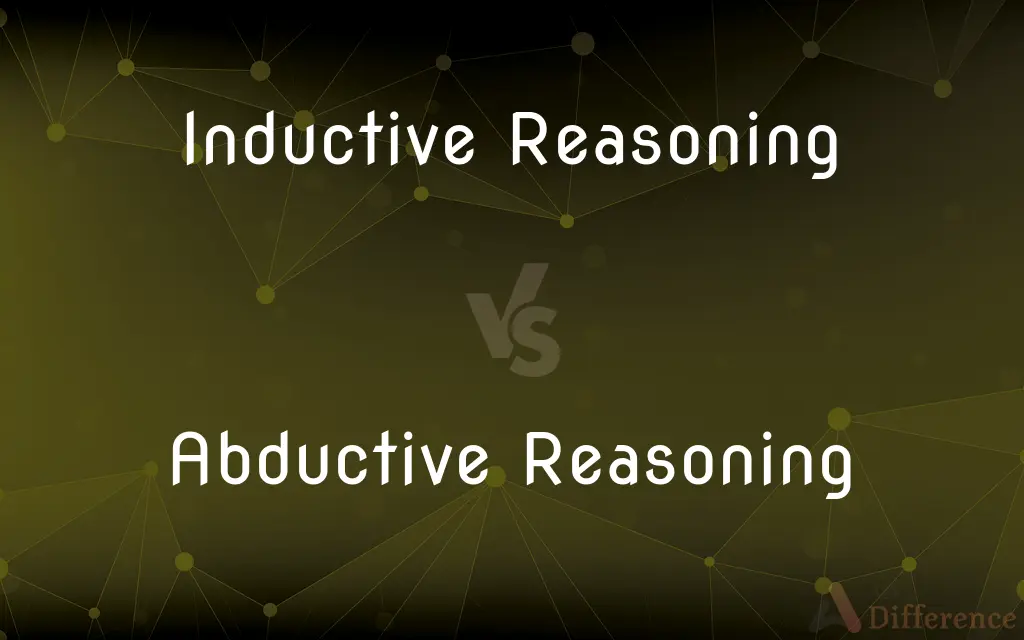Inductive Reasoning vs. Abductive Reasoning — What's the Difference?
By Tayyaba Rehman — Published on September 25, 2023
Inductive reasoning generalizes from specific instances to broader principles, while abductive reasoning seeks the best explanation for a set of observations. Both are non-deductive but vary in their approach to conclusions.

Difference Between Inductive Reasoning and Abductive Reasoning
Table of Contents
ADVERTISEMENT
Key Differences
Inductive reasoning is a method that involves drawing general conclusions from specific observations. It operates on the premise that if something is true in observed cases, it's likely true in similar, unobserved cases. Inductive reasoning moves from particular instances to broader generalizations.
Conversely, abductive reasoning is the process of arriving at the most probable explanation for a set of observations. It doesn't guarantee a correct conclusion but offers the best possible explanation given the information at hand. Abductive reasoning is often equated with "inference to the best explanation."
One key distinction is the nature of their conclusions. Inductive reasoning aims for general patterns and principles, often leading to predictions. For example, after observing that the sun rises in the east every day, one might conclude it will rise in the east tomorrow. Inductive reasoning assumes that observed patterns will continue.
Abductive reasoning, on the other hand, focuses on explanatory conclusions. For instance, if one sees wet grass and concludes that it rained last night, they're using abductive reasoning. They're identifying the most plausible reason for their observation, even though other explanations might exist.
In essence, while both inductive and abductive reasoning deal with uncertainties and probabilities, their primary distinction lies in their objective: generalizing patterns versus providing plausible explanations.
ADVERTISEMENT
Comparison Chart
Basis
Specific instances or observations
Set of observations
Aim
To generalize patterns
To provide the best possible explanation
Nature of Conclusions
General conclusions and predictions
Explanatory conclusions
Certainty of Conclusions
Conclusions are probable but not certain
Offers the most plausible but not necessarily true explanation
Typical Use
Scientific theories based on repeated observations
Diagnostic reasoning in medicine or troubleshooting in mechanics
Compare with Definitions
Inductive Reasoning
Making broad predictions based on specific cases.
Using inductive reasoning, she expected it to rain tomorrow after observing dark clouds today.
Abductive Reasoning
A reasoning process to determine the most probable cause or explanation.
The detective used abductive reasoning to identify the most likely suspect.
Inductive Reasoning
Probabilistic conclusions based on patterns.
Through inductive reasoning, after seeing several students wear red on Fridays, he predicted a school tradition.
Abductive Reasoning
Formulating the simplest and most likely reason for an observation.
Abductive reasoning led her to think the power outage caused the computer to shut off.
Inductive Reasoning
Inferring general principles from particular instances.
By studying particular chemicals, inductive reasoning led to broader understandings in chemistry.
Abductive Reasoning
Inference to the best explanation based on available data.
Seeing the broken window and missing items, abductive reasoning suggested a burglary.
Inductive Reasoning
A reasoning method that draws general conclusions from specific observations.
Through inductive reasoning, scientists developed the theory of gravity after observing falling objects.
Abductive Reasoning
Drawing conclusions based on likeliness rather than certainty.
After hearing a loud bang, his abductive reasoning concluded a car accident occurred nearby.
Inductive Reasoning
Generalizing from a limited set of data.
Inductive reasoning led her to believe that all birds can fly after only seeing eagles and sparrows in action.
Abductive Reasoning
Choosing the most plausible hypothesis from a set.
Through abductive reasoning, doctors diagnosed the rare disease after eliminating common ailments.
Common Curiosities
Do inductive and abductive reasoning guarantee true conclusions?
No, both reasonings offer probable conclusions but aren't definitive.
Can abductive reasoning lead to incorrect conclusions?
Yes, it offers the most plausible explanation, but other explanations might be true.
Is inductive reasoning more focused on patterns or explanations?
Inductive reasoning is more focused on identifying general patterns.
In what field is abductive reasoning often applied?
Abductive reasoning is common in diagnostics, like medicine or troubleshooting.
Is inductive reasoning common in scientific methods?
Yes, scientists often use inductive reasoning when formulating theories based on observations.
Share Your Discovery

Previous Comparison
Paleo vs. Keto
Next Comparison
Electric Car vs. Gasoline CarAuthor Spotlight
Written by
Tayyaba RehmanTayyaba Rehman is a distinguished writer, currently serving as a primary contributor to askdifference.com. As a researcher in semantics and etymology, Tayyaba's passion for the complexity of languages and their distinctions has found a perfect home on the platform. Tayyaba delves into the intricacies of language, distinguishing between commonly confused words and phrases, thereby providing clarity for readers worldwide.















































